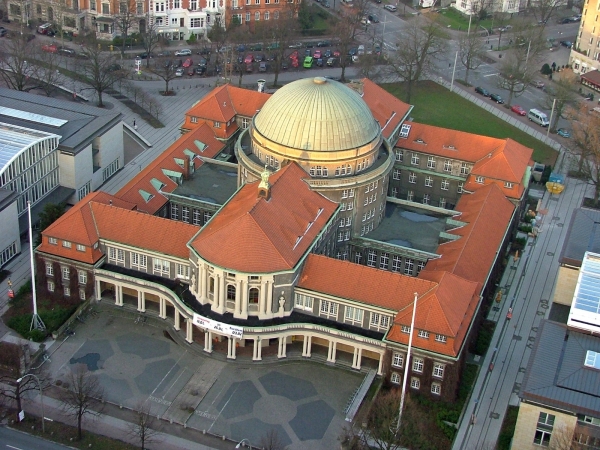https://www.uni-hamburg.de/
Description
Universität Hamburg was founded in 1919 by local citizens. Important founding figures include Senator Werner von Melle and the merchant Edmund Siemers. Nobel Prize winners such as the physicists Otto Stern, Wolfgang Pauli and Isidor Rabi taught and researched at the University. Many other distinguished scholars, such as Ernst Cassirer, Erwin Panofsky, Aby Warburg, William Stern, Agathe Lasch, Magdalene Schoch, Emil Artin, Ralf Dahrendorf, and Carl Friedrich von Weizsäcker, also worked here.
Today Universität Hamburg is the largest institution for research and education in northern of Germany. As one of the country's largest universities, we offer a diverse range of degree programs and excellent research opportunities. The University boasts numerous interdisciplinary projects in a broad range of fields and an partner network of leading regional, national, and international higher education and research institutions. The University has developed a number of successful key research areas that shape its overall research profile.
- Climate, Earth, Environment
- Photon and Nanosciences,
- Manuscript Research
- Neurosciences
- Particle, Astro- and Mathematical Physics
- Infection Research and-, Structural Biology
- Health Economics.
Universität Hamburg offers approximately 170 degree programs with its 8 faculties:
- Faculty of Law
- Faculty of Business, Economics and Social Sciences
- Faculty of Medicine
- Faculty of Education
- Faculty of Humanities
- Faculty of Mathematics, Informatics and Natural Sciences
- Faculty of Psychology and Human Movement Science
- Faculty of Business Administration (Hamburg Business School)
Universität Hamburg is also home to several museums and collections, such as the Zoological Museum, theHerbarium Hamburgense, the Geological-Paleontological Museum, the Loki Schmidt Garden, and the Hamburg Observatory.
Universität Hamburg is committed to sustainability. All our faculties have taken great strides towards sustainability in both research and teaching.
Most undergraduate degrees take 3 years. All programs are divided into an introductory phase (first year), an in-depth phase (second year), and an advanced phase (third year). The final phase is dedicated to writing the bachelor's thesis. A bachelor's degree qualifies you to pursue certain careers; and apply for graduate programs.
Your choice of subject determines the degree awarded: subjects in the humanities generally award a Bachelor of Arts, subjects in the natural scientists award a Bachelor of Science and our two interdisciplinary law programs offer a Bachelor of Laws. Teacher training programs also award a special bachelor's degree.
A Bachelor of Arts program is structured as follows:
- 1 major (50% or 90 credit points)
- 1 minor (25% or 45 credit points)
- general professional skills (ABK) courses 15% or 27 credit points
- elective courses (10% or 18 credit points).
Bachelor of Science and Bachelor of Laws programs is structured as follows:
- 1 major (75% or more)
- general professional skills (ABK) courses (15% or less)
- elective courses (10% or less).
Bachelor of Science and Bachelor of Laws degree programs do not contain a minor component
After completing a bachelor’s degree, graduates can pursue a Master of Arts or a Master of Science straight away, or take a break and enroll at a later date. As a rule, it takes 5 years to complete a bachelor’s followed by a master’s degree. Universität Hamburg offers two different types of master’s degree. Consecutive master’s programs deepen knowledge and skills acquired during a bachelor’s degree and graduates may commence these programs straight after graduation. These programs are either interdisciplinary or based on a different discipline. Professional master’s degree programs are professional graduate programs that develop existing professional skills in a particular field. Applicants must thus demonstrate at least 1 year of professional experience. The requirements and qualifications are the same for both types of degree.
Masters programs may have admission restrictions and individual subjects also have different admission requirements. You can find more information about master's programs in our German language information sheet on master's and professional master's degree programes (Master- und Aufbaustudiengänge) Master- und Aufbaustudiengänge or in the bilingual online guide to degree programs at Universität Hamburg.
Specific details
Location
Mittelweg 177, 20148 Hamburg, Germany


